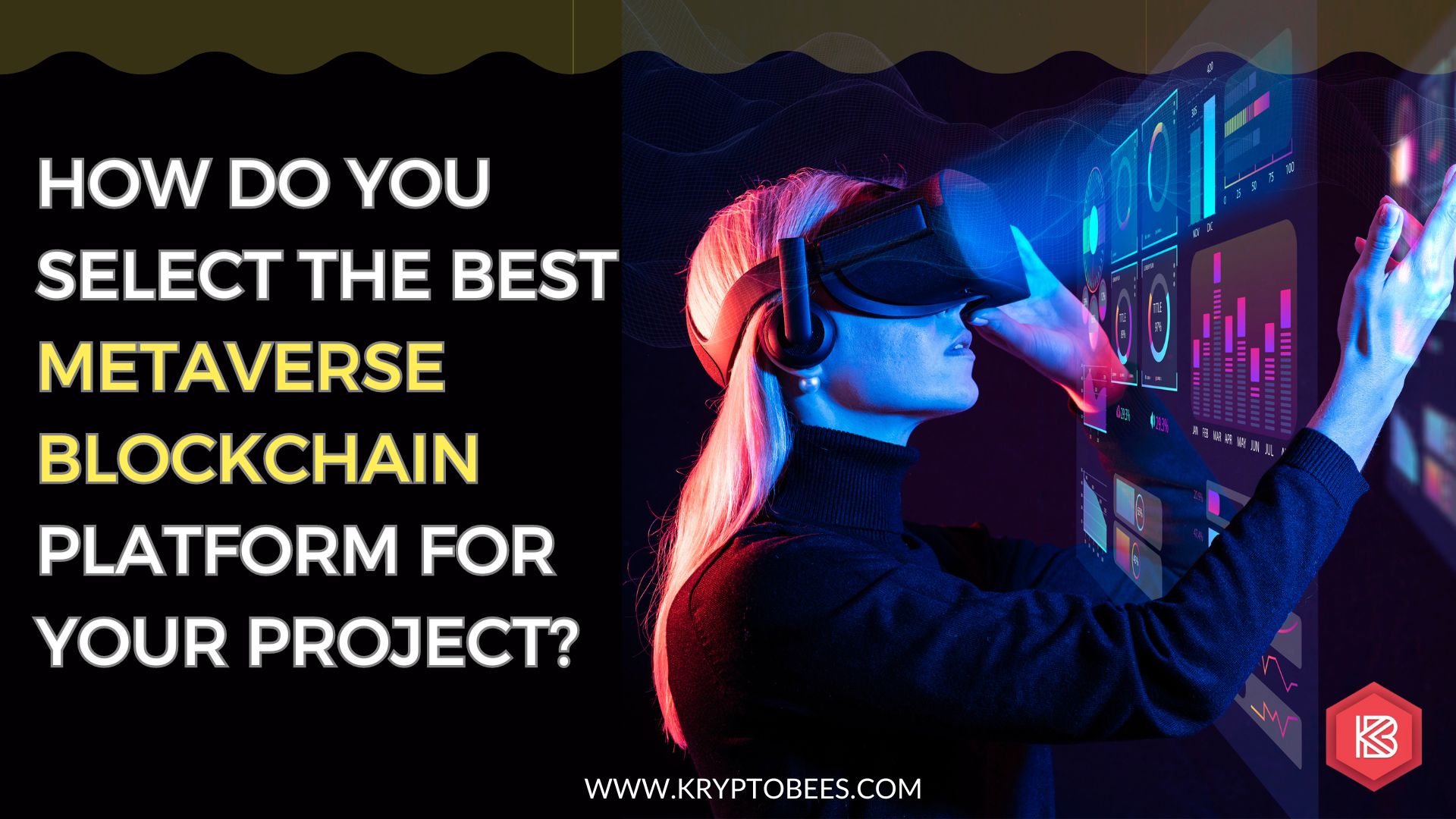How do you select the Best Metaverse Blockchain platform for your project?

Exploring the metaverse heralds an era of digital innovation, reshaping our interactions, connections, and business landscapes. Yet, finding the ideal metaverse development company can be daunting, with its unique hurdles. This guide aims to navigate these complexities, empowering you to select the right team and tech foundation, setting sail to redefine digital interactions. Businesses increasingly recognize the metaverse blockchain platform’s internet future. Crafting a metaverse development demands specialized expertise and a profound grasp of its concept roots. Hence, choosing the perfect Metaverse Development Company becomes pivotal for your project’s triumph. Coined by sci-fi luminary Neal Stephenson in ‘Snow Crash’ (1992), the metaverse has become a pivotal tech frontier. The company choice stands as a linchpin, holding the potential to shape your venture’s trajectory. Our article delves into the pivotal aspects to weigh while opting for a company for your metaverse blockchain platform undertaking.
What does Metaverse Development entail?
The Metaverse development encapsulates a shared virtual realm, blending the boundaries between the real and digital worlds with blockchain development to deliver an all-encompassing user experience. With a rising appetite for Metaverse encounters, businesses are turning to Metaverse development company to actualize their visions.
Metaverse development and blockchain development entails crafting software applications that enable diverse user engagements—from gaming to socializing, shopping, and learning. This immersive sphere, accessible through smartphones, computers, and VR headsets, hinges on cutting-edge tech like virtual reality, delivering an interactive landscape for users to explore and engage with seamlessly.
What drives the necessity for brands and businesses to embrace the metaverse platform development?
The metaverse is a collective virtual domain where users inhabit avatars within a 3D space. This space integrates 3D elements into the real world, evolving through user interactions. Initially embraced by gamers and tech enthusiasts, it now underpins a thriving digital economy.
In this dynamic landscape, users wield the power to craft, purchase, and trade, revolutionizing economic transactions within this transformative environment.
Get to know about the trends in the Metaverse platform development
Firstly, let’s grasp the primary metaverse categories to shed light on emerging trends within these diverse spaces.
Metaverse in Virtual Reality (VR)
This category delivers complete immersion within virtual realms, accessed through VR headsets and controllers. Users navigate and interact in entirely synthetic digital environments for a fully immersive experience.
Metaverse in Augmented Reality (AR)
Augmented Reality (AR) intertwines digital elements into reality, enriching physical surroundings. Users engage via smartphones or AR glasses, seamlessly integrating digital overlays into their environment for immersive experiences.
Hybrid Metaverse development
The hybrid metaverse unites VR and AR, blending virtual and real aspects by integrating virtual content into reality and vice versa, providing a versatile user experience.
Avatar technology
The blend of AI and computer-generated visuals forms photorealistic avatar tech, crafting lifelike virtual user representations. Combining graphics, motion tracking, and facial recognition, it creates versatile 3D avatars for diverse virtual realms.
Web3
Web3, a decentralized internet phase, enables secure, trustless engagements, eliminating intermediaries for safer, private online interactions. Decentralization ensures fairness and trust, preventing dominance and empowering users’ independent access to services.
AR/VR
The enduring allure of AR/VR stems from heightened digital content interest, driving increased consumer engagement and industry revenues. AR, VR, and XR enhance customer experiences, prompting businesses to explore VR-based marketing with new headsets and innovative scent technology.
New marketing channels
Global marketing firms leverage metaverse development and blockchain development for innovative brand promotion via immersive AR and MR technologies. The surge in VR/AR popularity drives revenue through collaborations, events, and blockchain development-enhanced gaming experiences like Fortnite and Roblox.
Types of Blockchain Platforms Networks utilized for Metaverse development
Blockchain development frameworks are primarily categorized into three types: public networks, permissioned networks, and private networks.
Public Networks –Decentralized networks allow broad participation but come with higher costs and slower operations, making them less attractive as essential Blockchain platforms for startup ventures.
Permissioned Networks –These networks are publicly visible but feature controlled participation. They boast rapid speeds, minimal latency, and ample storage capacity, distinguishing them from typical public networks.
Private Networks – Limited to trusted entities, these networks aren’t open to the public. They excel in speed with no latency, yet often lack the security and immutable traits seen in decentralized networks or utilize cryptocurrencies.
Some of the leading frameworks for Blockchain development
- Ethereum
Debuting in 2015, this platform pioneered smart contracts and gained supremacy in Blockchain. It’s the developers’ top choice for decentralized app construction. Led by a dedicated team and a thriving community, it evolves, notably with Ethereum 2.0. These strides aim to solidify its position as the prime startup Blockchain platform.
- Hyperledger
An open-source permissioned Blockchain focuses on robust DLT creation, fostering cross-industry collaborations. Comprising six frameworks and seven tools, it stands as a leading platform empowering enterprises to embrace Blockchain at scale, making it a favored choice in the Blockchain sphere.
- EOS
A Blockchain platform, leveraging smart contracts, supports various decentralized app launches openly. All users can create EOS accounts and partake in network transactions, sparking frequent EOS-Ethereum comparisons. EOS excels in Blockchain by using token-holder votes to delegate block producers, ensuring consensus among a vast pool of approved candidates.
- R3 Corda
Comprising more firms, this enterprise Blockchain consortium united to develop Corda, an open-source Blockchain platform. Specializing in hosting enterprise-distributed apps across healthcare, insurance, digital assets, and finance, Corda stands out. Its implementation in Kotlin ensures seamless integration with various business infrastructures, fostering the creation of advanced Blockchain app development services.
- Quorum
This private enterprise iteration of Ethereum, named Quorum, focuses on the finance sector. Brands employing Quorum can deploy Solidity-written smart contracts, whether privately or publicly. As a permissioned Ethereum variant, it holds significance for numerous financial institutions, playing a pivotal role in the Enterprise Blockchain realm.
Considerable criteria for assessing and selecting the appropriate metaverse platform
Once the target audience and strategy are clear, selecting a platform crucially involves effective implementation and audience engagement. Identifying the right platform entails assessing specific elements and features that align with your metaverse strategy, a process DMG has outlined for evaluation.
Personalization
Platforms must enable businesses to craft enticing, immersive, and branded environments, ensuring a sleek and captivating design.
Decentralization
Platforms should establish a decentralized economy, granting businesses renting or purchasing virtual spaces complete rights and authority over those specific areas.
User experience
Several features, including avatars, digital twins, 3D environments, and real-time communication, significantly enhance the user experience within the platform.
Platforms and Accessibility
Comprehending user access to platforms is vital. Accessibility via apps, desktops, tablets, mobiles, VR headsets, or AR glasses is immensely valuable.
Integrations
Apart from media and content, platforms should allow seamless integration with third-party business systems, software, E-commerce tools, and payment gateways.
Crypto wallet and cryptocurrency
Select a platform that integrates with leading crypto wallets and various cryptocurrencies for comprehensive functionality and compatibility.
Besides essential elements, a robust backend team is crucial for businesses entering the metaverse. Platforms must allow future enhancements. Despite seemingly straightforward steps, transitioning requires significant resources, time, expert guidance, and thorough comprehension of tools and processes.
Metaverse: Embracing the Future
Strategic planning precedes business entry into the metaverse, a crucial step for achieving objectives. Audience research is mandatory to understand the target demographics. Identify platforms with a high concentration of active users within the desired audience. Develop a comprehensive content strategy tailored for the metaverse environment. Seek out the optimal platform that aligns with your business goals and content strategy.
Partnering with experienced professionals is vital for guiding every step from planning to execution in the metaverse. Reach out to evaluate your company’s current online presence and determine metaverse readiness. Contact us to explore whether your business is prepared to establish a strong presence in this evolving digital realm.
What is the expense involved in developing a Metaverse app?
Expenses for developing Metaverse applications fluctuate based on technology and time, making the cost dynamic. The development cost typically ranges between $25,000 to $400,000 for a Metaverse app, varying across industries.
Industries benefiting from Metaverse app development span various sectors, with more anticipated to join in the future. Team composition includes:
– Three to four full-stack developers proficient in Node.js and React.js
– UI/UX developer
– Development team skilled in UNITY, UNREAL, and CRYENGINE
– Three 3D modelers experienced in Blender and Max3DS
– Decentralized wallet developer
– Decentralized dApp producer
Industry-specific costs:
– Online Gaming: Ranges between $30,000 to $300,000 for Metaverse development.
– Social Media: Average cost hovers between $25,000 to $400,000 for creating a social media-based Metaverse.
– Real Estate: Building a real estate-focused Metaverse can cost from $15,000 to $300,000 due to its intricate nature.
Become part of the leading Metaverse Blockchain projects with Kryptobees
Dive into the forefront of Metaverse Blockchain innovation through the guidance and expertise of Kryptobees. By partnering with us, you embark on a transformative journey, tapping into the pulse of cutting-edge projects that redefine the future. Our collaborative approach empowers your venture to soar among the leading Metaverse Blockchain initiatives, leveraging advanced technologies and strategic insights.
At Kryptobees, we don’t just foster projects; we cultivate pioneers. We provide a comprehensive suite of support, from ideation to execution, ensuring that your vision thrives within the ever-evolving Metaverse realm. Our commitment to excellence, paired with a deep understanding of Blockchain intricacies, propels your endeavor toward industry recognition and sustainable growth.
Join hands with Kryptobees to unlock the full potential of Metaverse Blockchain projects. Together, we’ll shape the landscape of tomorrow, driving innovation, and establishing your presence among the vanguards of this groundbreaking technological landscape.
 Discuss Project!
Discuss Project!
